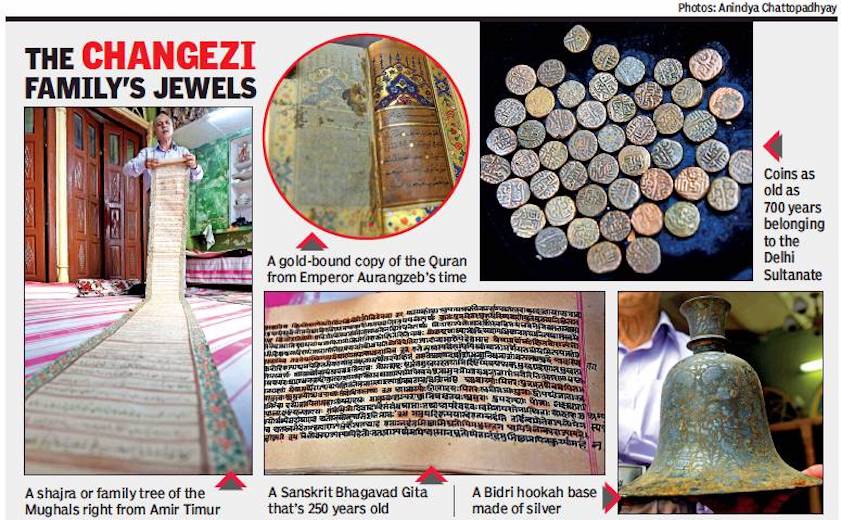Delhi: heritage
This is a collection of articles archived for the excellence of their content. |
Personal collections
The Changezi family collection, Chitli Qabar

From: Mohammad Ibrar, The Walled City family that has preserved India’s past, August 23, 2018: The Times of India
In 1857, Nawab Mirza Shahbaz Baig Changezi, the deputy collector of Hisar, joined the Great Uprising. After months of being a rebel, he was arrested and sentenced to death.
But during the trial, the Mirza was more worried about his collection of books, royal fir mans, coins and manuscripts that he had acquired as a hobby. Most of it survived. Today, his great-great grandson Sikandar Mirza Changezi has carried forward the legacy. From coins that are over 700 years old to a gold inlaid Quran from Emperor Aurangzeb’s time, the Changezi family’s prized possessions are “national treasure” that must be saved.
In the past few years, the family has donated thousands of rare books so that they are better preserved and put to better use. As many as 21,000 books in old Delhi’s Shah Waliullah library were donated by the Changezis.
Sikandar Changezi is 52 and lives with his family near Chitli Qabar and is involved in handicraft making. He says the family tries to preserve rare documents in whatever way they can. “We put neem leaves in the files and the pages of the Quran and the nearly 250-year-old Sanskrit Bhagvad Gita. And during winter, we keep them out in the sun for a week. Thankfully, nothing drastic has ever happened to the collection,” Changezi said while opening a 25-food shajar or family tree ofthe Mughals from Amir Timur down to Bahadur Shah Zafar.
Changezi claims he is a descendant of the Mongol ruler Genghis Khan and that his great grandfather saved all artefacts and collected more when he was employed in the court of the Maharaja of Alwar in the late 19th century.
“It was my father and grandfather who were true patriots and participated in the freedom struggle,” Changezi said, remembering his father Naseem Mirza Changezi who died this April at a ripe age of 108.
“My father was involved in the freedom movement while working with lawyer Asaf Ali. He had even befriended Bhagat Singh,” said Changezi.
He showed the TOI team some of his prized artefacts, including a silver hookah base from Bidar and a 20-foot manuscript containing the names of the prophets of Abrahamic faiths. “The coins and the hookah still have the markings on them clearly visible. You can make out all the animals, calligraphy and plants on the hookah,” Changezi said.
But the family lost some items during Partition. “My grandfather Mirza Afrasiab Changezi was in Bharatpur, Rajasthan, when our haveli was attacked and nine trunks having priceless items were completely destroyed. If only we had those, it would have been the best collection of artefacts that a single family could own,” Changezi said, adding that the family never left for Pakistan despite being attacked.
“My father’s many family members left for Karachi but he refused to leave. He said he gave his blood to this nation and will die here while keeping all his treasures in the country he belongs to,” Changezi said.
Changezi claims he is a descendant of the Mongol ruler Genghis Khan and that his great grandfather saved all artefacts when he was employed in the court of the Maharaja of Alwar in the late 19th century